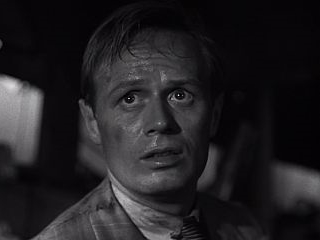My local art house theatre is running a festival of film noir and noir-adjacent movies from around the world. Though I am a fan of the genre, there were quite a few movies on the schedule I have not seen. These movies are best seen on the big screen, so I have held back on watching a lot of these movies until opportunities like this (see my Joseph H. Lewis reviews from last year as examples).
For me the essence of noir is a central character who is caught up in a series of events that they cannot break out of. Harry Fabian's trajectory is a sterling example of this theme. From the start of the movie (he is introduced running from creditors), Harry is constantly working angles to keep himself above water. Harry is basically a home fatal who preys on anyone who gets in his way. He figures out what their weakness is
and turning that to his advantage.
In the lead role, Richard Widmark is great. A few years from his breakout as Tommy Udo in Kiss of Death, he gives Harry a similar level of nervy energy. His character comes off as cocksure and reckless - a consummate performer who is totally comfortable when playing people for his own ends. Though he displays a fleeting self-awareness, he is addicted to his delusions of wealth and power. Every time he catches a whiff of an opportunity, he jumps without thinking - a testament to his arrogance, it is the quality which ultimately leads to his downfall.
In the lead role, Richard Widmark is great. A few years from his breakout as Tommy Udo in Kiss of Death, he gives Harry a similar level of nervy energy. His character comes off as cocksure and reckless - a consummate performer who is totally comfortable when playing people for his own ends. Though he displays a fleeting self-awareness, he is addicted to his delusions of wealth and power. Every time he catches a whiff of an opportunity, he jumps without thinking - a testament to his arrogance, it is the quality which ultimately leads to his downfall.
Admirably, this movie does not resolve with a happy ending - Harry's luck runs out, he loses the one person who loves him, and he dies.
In fact, nobody leaves this movie in the black - Kristo (Herbert Lom) keeps his empire but loses his father; Phil Nosseross (Francis L. Sullivan) loses his wife and shoots himself; his wife Helen (Googie Withers) tries to make it on her own and discovers she has been betrayed. The movie's overall message is extremely nihilistic: no matter what you want - you will not get it.
In this respect it is easy to see this movie as an allegory for what was happening off-screen: director Jules Dassin was a victim of the House Un-American Activities Committee for his supposed communist sympathies, and was blacklisted from Hollywood while he was shooting the film in England.
In this respect it is easy to see this movie as an allegory for what was happening off-screen: director Jules Dassin was a victim of the House Un-American Activities Committee for his supposed communist sympathies, and was blacklisted from Hollywood while he was shooting the film in England.
Max Greene's photography of London locations is terrific - you really get a sense of the post-war cityscape, a scrap heap fought over by scavengers. The movie is filled with great visuals: Nosseross's darkened office, shot from low angles as the owner gloats over his domain; the way
light plays across Richard Widmark's sweaty face as he hears the footsteps of his pursuers approaching. It is incredibly claustrophobic and oppressive, reinforcing the sense that the city is suffocating everyone living in it.
All the characters are defined by their inability to escape: with Harry, it is his own nature; with Helen, it is her economic dependence on other people; her husband cannot live without Helen, despite her open disdain. The one character who manages to break free is Harry's on-off girlfriend Mary, played by Gene Tierney. And that is because she gives up the thing (Fabian) that she desires.
Of the supporting cast, the standout is Googie Withers. Beneath her tough veneer, Helen is just like Harry. She wants her own piece of the pie. Unlike Harry, she does not have alternatives (i.e. his relationship with Mary). While we do not get a lot of backstory, the implication is that she used to be a hostess who struck a rich man's fancy. Her motivation is financial independence for survival. Harry has opportunities (both past and present) to have a better life - Helen never does.
Filled with great sequences, and an incredibly bleak tone, Night and the City is a great noir based around a turbo-charged lead performance and the unique atmosphere of its main location.




No comments:
Post a Comment